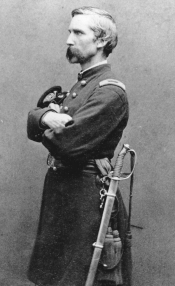The What, the How, and the Why
Written by Anthony Demangone
On Sunday, I had the wonderful opportunity to have dinner with a CEO of a NAFCU member credit union. We talked about this and that, the weather, our families, and additional small talk.
Slowly, the conversation turned to more meaty matters. We talked about management, and what we were doing. He said the following.
"Too many people in organizations don't understand why they do what they do. They may understand what they do. Or how. Â But not why. We focus on the "why" constantly. We exist to make our members' lives better."
Perfect.
People to be part of something. And they really want to be part of something that matters. That's where the "why" is so important.

Col. Joshua Chamberlain
I thought through his thoughts, and a movie came to mind...Gettysburg. In the movie, one of my favorite historical figures, Col. Joshua Chamberlain, played a role. In one scene, Chamberlain learns that he must take charge of 120 Maine soldiers who are refusing to fight.
Mutineers.
He's about to lead his regiment north to Gettysburg. He has little time. What to do?Â
Chamberlain chose to focus on the "why."Â
There is some debate whether Chamberlain said the following words exactly. That a speech was made to the mutineers is certain. It was documented by numerous sources. The movie takes its language almost entirely from The Killer Angels. In any event, I've read a bunch about Joshua Chamberlain. The following words seem as those he would say.Â
This regiment was formed last summer in Maine. There were a thousand of us then. There are less than three hundred of us now. All of us volunteered to fight for the union, just as you did. Some came mainly because we were bored at home -- thought this looked like it might be fun. Some came because we were ashamed not to. Many of us came because it was the right thing to do. And all of us have seen men die.
This is a different kind of army. If you look back through history, you will see men fighting for pay, for women, for some other kind of loot. They fight for land, power, because a king leads them or -- or just because they like killing. But we are here for something new. This has not happened much in the history of the world. We are an army out to set other men free.
America should be free ground -- all of it. Not divided by a line between slave state and free -- all the way, from here to the Pacific Ocean. No man has to bow. No man born to royalty. Here, we judge you by what you do, not by who your father was. Here, you can be something. Here, is the place to build a home.
But it's not the land. There's always more land.
It's the idea that we all have value -- you and me.
What we're fighting for, in the end, we're fighting for each other.
Sorry, I didn't mean to preach. You, you go ahead. You talk for awhile. If you -- If you choose to join us, you want your muskets back, you can have 'em. Nothing more will be said by anybody anywhere. If you choose not to join us, well you can come along under guard, and when this is all over I will do what I can to see you get a fair treatment. But for now, we're moving out.
Gentlemen, I think if we lose this fight, we lose the war. So if you choose to join us, I'll be personally very grateful.
The mutineers? They joined the fight.
I never tire of that scene. A touch of Hollywood? Perhaps. But a wonderful example of the power of "why?"Â
Certainly.Â
Now, here's the question of the day. Does your entire team understand the "why?"Â
